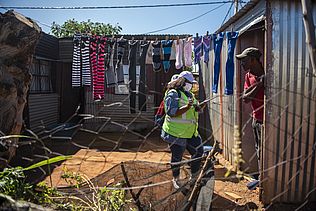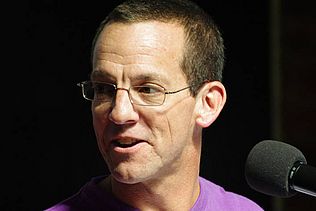There can be no doubt that COVID-19 has exposed the faultlines of egregious inequality – both within and between countries. It is particularly evident in the huge inequalilty in access to vaccines for COVID-19 so eloquently called out on Monday this week by the Director General of the WHO as a ‘catastrophic moral failure’ looming as a result of protection of profits of vaccine manufacturers at the expense of the rights of health workers and vulnerable populations in poorer countries – a situation that has arisen out of the failure of the system constructed supposedly to achieve equitable access for vaccines.
I speak here as a member of the People’s Health Movement, a participant in the civil society C19 Peoples Coalition and a public health professor in South Africa, believing in social justice that can only be achieved if there is global social justice, not one system for Europe and another for poor people and poor countries.
COVAX has too many flaws (it solidifies the market, prices are not transparent, what you get is not transparent, what you get will be long after everyone else buys something, what you get may not work for your health system – e.g. some vaccines requires very low temperature freezing). COVAX is currently only providing about 15% of the world’s vaccines yet is meant to reach all LICs who are unable to pay. We have 56 bilateral deals at last count and COVAX is still in the doldrums. HIC have purchased more than 4 times that COVAX has been promised to provide countries that cannot afford.
Vaccine nationalism is no longer spoken of with criticism – it is now accepted as the norm. South Africa is suddenly purchasing huge amounts of vaccine for its people when in December all it could talk about was COVAX – we still don’t know how much and what is coming via COVAX and the SA government has cut bilateral deals. In that, they are simply doing what the rest of the north have been doing.
Even within South Africa, we see the Western Cape province lining up to go independently to the manufacturers outside of national procurement – this is vaccine nationalism at provincial level and it has gone mad!
This audience knows well that in Germany there is huge pressure on Chancellor Merkel to bypass the EU so as to procure enough vaccine for the whole population.
This situation reflects the broader political environment in which co-operative multilateralism has given way to national (and even sub-national) interest. Member states of the WHO should work with WHO to strengthen it and provide it with sufficient funding to do its job. The WHO is meant to be the steward of Global Health but it has been weakened by decades of underfunding and political interference by both powerful states and non-state actors. Will Biden restore the US’s commitment to the WHO? That will be as important to solving the challenges facing Africa as tinkering with the COVAX.
Essentially, what we have now is an uncoordinated and opportunistic set of arrangements with no guarantee of local benefit. For example, a local SA pharmaceutical company will be filling and finishing a J&J vaccine but it is entirely unclear if any of those vaccines will be used for South Africans or for Africans in need. The terms and conditions of that agreement is entirely untransparent and left to two private companies to negotiate. As the Aspen press release read “We are particularly pleased to be given the opportunity of providing assistance for patients in need across the world from our South African base.” Nothing for South Africa, nothing for Africa, but J&J has a production site in South Africa with only the most minimal of technology transfer and no capacity to produce the vaccine in South Africa for Africa in the long-term. That cannot be right.
Tedros has shown up two flaws in the system:
- Lack of transparency about what is being negotiated in the bilateral contracts and at what price, what volumes and what delivery dates – since it is clear that preferences are being given to voting adults in northern countries whose need is less than the health workers, elderly and persons with co-morbidities in LMICs;
- Why haven’t vaccine producers provided WHO with full data for regulatory review in real time, to accelerate approvals?
But the problem is that if countries that have over-procured give their excess back to COVAX, at what price will they do so, and when, and under what conditions. So, any LMIC will be at the mercy of northern countries charity. This is not a sustainable system.
Meanwhile, in Africa, the sorry state of health systems remains a huge block – Zimbabwe’s health system is unable to manage yet the more vaccine South Africa procures, the less will be available for countries who can’t afford to go knocking on the Serum Institute of India’s doors. We know that the AU CDC has begun negotiating vaccine procurement for multi country access in the continent, yet the political structures of our countries, such as the SADC has not been proactive.
But we do need local production in Africa. Why?
- Firstly, the current system does not guarantee enough vaccine via COVAX, nor sufficient vaccine in time;
- Secondly, the vaccine will need to be provided annually;
- Thirdly, the virus is capable of mutating fast; we still are not sure that the vaccines will be as effective for the N501Y variant and it is almost certain we will be asking this same question of new variants that will appear. We can’t wait for a northern producer to discover a new form of vaccine for a southern problem.
- We know that local production is already advanced in Asia, advancing in Latin America but not in Africa
To ensure equitable access to vaccines, we need regional cooperation given the logistical, legal and institutional capacities and frameworks we may lack or may have to differing degrees. We already have regulatory authorities in the region that have been cooperating with regard to access to medicines and we can build on this this to ensure the safety and cross-border issues given the movement of people between and amongst countries of the region.
What this points to is that the COVAX mechanism may have been thought of as a good compromise but it is not working – you only have to look at South Africa to realise how we would not have been able to rely on COVAX – our high risk population is probably between 40 to 50% of the population far more than the ceiling that would be supplied by COVAX of 20% of the population. And we still don’t know what COVAX will deliver to SA.
A better mechanism and more sustainable would have been to unlock the patents protections on vaccines (and other health technologies) which would bring down prices and enable conditions for local production in LMICs. This is the TRIPS waiver proposed by SA, India and other LMICs, but opposed by the EU, US and others with pharmaceutical producer interests.
The waiver is the one proposal that does change the rules because it challenges the fundamental problem – that the system has centralised power in the hands of the vaccine producers and their states. The fact that DG Tedros has to plead with vaccine producers to "allow" states to share doses, and appeal to countries to “work together in solidarity” emphasises that the bigger issue of corporate power is still being sidestepped.
What we have now is a country-by-country stampede and a lack of benefit sharing – South Africa and Egypt have participated in vaccine trials and Uganda starting a trial as we speak – yet no benefit sharing agreement has been reached, and none for Africa as a whole. But UNESCO, International ethics declarations and international conventions, such as the Nagoya Porotocol of the Convention on Biological Diversity signed by Germany and other European countries talk about benefit sharing from genetic research; The CESCR recognises the right of everyone to enjoy the benefits of scientific progress. I quote from the recently adopted General Comment 25 on this REBSP, which sets out the obligations of states:
- States should ensure that everyone has equal access to the applications of science, particularly when they are instrumental for the enjoyment of other economic, social and cultural rights.
- States should make every effort both in national regulations and in international agreements on intellectual property, to guarantee the social dimensions of intellectual property, in accordance with the international human rights obligations they have undertaken.
- A balance must be reached between intellectual property protection and the open sharing of scientific knowledge and its applications. Ultimately, intellectual property is a social product and has a social function. Consequently, States parties have a duty to prevent unreasonably high costs for access to essential medicines from undermining the rights of large segments of the population to health.
- States parties also have an extraterritorial obligation to regulate and monitor the conduct of multinational companies over which they can exercise control.
The message could not be clearer…
And remember that we still need strong health systems in Africa
- To deliver the vaccines
- While vaccines are not yet able to achieve herd immunity, or, if they turn out to be less effective than hoped, we will still need testing, contact tracing and other comprehensive public health measures – which are constrained in Africa, dependent on global supplies and vulnerable to the same market inconsistencies – e.g. shortage of supplies for NSP PCR testing
- require long term investment in terms of building systems that address the public health needs of the populations
It’s time the world woke up. This inequality will kill people on a global scale as it did with HIV, until Civil Society forced Big Pharma to cede power. That’s the scenario we are looking at again. Hopefully, we have learnt something from the past, before too many of our people die.




